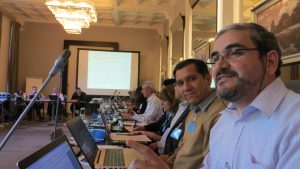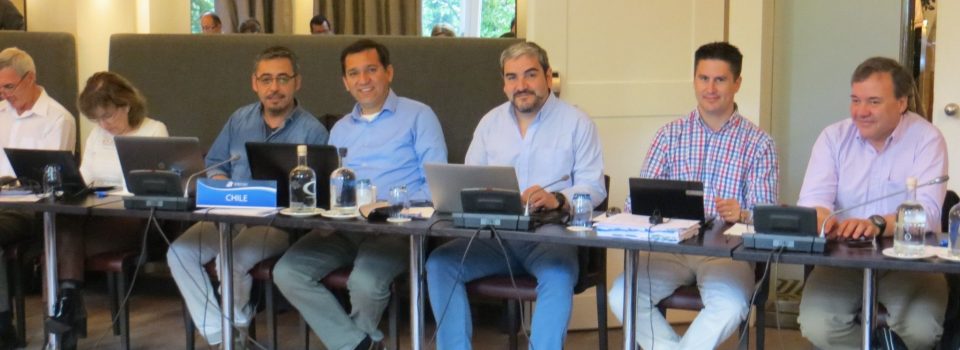Chile attends to the 4th Meeting of the Scientific Committee of OROP-PS. Organización regional de ordenamiento pesquero del Pacífico Sur. (www.SPRFMO.org)
November 4th, 2016
Ignacio Payá, Researcher of IFOP
The annual meeting of the scientific committee is where scientific recommendations for the organization are made, therefore is very important since data, models and biologically acceptable catches are analyzed, also different subjects for the management of different fisheries.
The Chilean delegation was composed by: Maria Angela Barbieri, Mauricio Galvez, Mario Acevedo, of Subsecretaría de Pesca, Ignacio Payá of Instituto de Fomento Pesquero, Cristián Canales of Pontificia Universidad Católica de Valparaiso, Achilles Sepulveda of Inpesca, Albert Arthur of Anapesca AG, Andrés Couve of Sonapesca.
From October 7 to 9, mackerel stock assessment (“Benchmark”) workshop was carried out, where sensitivity analysis of the model to different data, data weighting and model configurations were evaluated. Then from 10 to 14, the 4th Meeting of the Scientific Committee of the OROP-PS was developed, and the following tasks were accomplished:
1) Continuation and completion of mackerel stock assessment and biologically acceptable catch was estimated.
2) Revision of data and stock assessment of cuttlefish in the area of the organization.
3) Revision of data and evaluation of Orange roughy in the area of the organization.
4) Analysis of exploratory fishing for Codfish in the area of the organization.
5) Analysis of the distribution and management of vulnerable marine environment (VME).
6) Review of the program of scientific observers and electronic monitoring.
7) Analysis of the research program from scientific committee.
Ignacio Payá, IFOP researcher said “I attended as a representative of IFOP in stock assessment issues on Mackerel, cuttlefish and Orange roughy, under the consultancy project on international matters of IFOP to the Subsecretaría de Pesca y Acuicultura. I participated in the analysis and discussion of most topics covered in the scientific committee and specifically:
a) I presented orally the results of otolith microstructure projects on mackerel and reading protocol and assigning age of mackerel, which were made by colleagues of IFOP.
b) I participated in assessment model settings and the discussion of results.
c) I informed on my participation and major findings in the workshop of international experts in the Orange Roughy held this year in Newzealand.
d) I participated in discussions of data and first stock assessment of cuttlefish in the area of the OROP-PS”.
Conclusions of national interest
Mackerel
Tendency to population recovery has been ratified and the spawning biomass is estimated close to 67% of the target biomass (RMS), a situation generated by the entry of good year classes together with the reduction and control of fishing mortality below its acme (Fmsy). With this and maintaining the level of fishing mortality that would have been achieved if the catch 2016 had reached the quota set for this year, the recommendation catch for 2017 is 493 thousand tons, criteria under which the risk of compromising the recovery target population by 2018 is still low and tends to zero in the long run.
Cuttlefish
In terms of cuttlefish catch levels, cuttlefish is the main resource of the organization. The stock assessment models are in development and data and indicators of abundance available for models are being configured.
